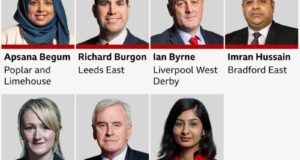
Boris Johnson’s government has set out “ambitious” policies on crime, health, the environment and Brexit in a Queen’s Speech that opposition parties have dismissed as an “election manifesto”.
Plans for tougher sentences for violent offenders and legal targets for cutting plastic pollution are among 26 bills set out at Parliament’s State Opening.
The BBC’s Laura Kuenssberg said it was a “long shopping list”.
But with the PM having no majority, many of the bills may not become law.
Our political editor said the PM was keen to focus on “bread and butter issues” like funding for schools and the NHS, or coming up with, at long last, a new way of caring for the elderly.
But she said there was no guarantee the legislative programme would be approved by Parliament. If MPs reject it, it will trigger renewed calls for a general election.

Labour has described the whole exercise as a political “stunt” while the Lib Dems said Mr Johnson couldn’t deliver on his promises as Brexit would make the UK poorer.
Despite continuing Brexit uncertainty, the government has said it is determined to press ahead with its plans, announcing its intention to hold a Budget on 6 November.
Negotiations over the UK’s departure from the EU continue, with the UK trying to secure an agreement that will enable the UK to leave by 31 October.
The government says if it can strike a deal with the EU, it will introduce a withdrawal agreement bill and aim to secure its passage through Parliament before the Halloween deadline, although intensive talks over the weekend failed to produce a breakthrough.

the Queen’s Speech as a “party political broadcast”
The Queen’s Speech is famous for its pageantry – with the monarch arriving at the Palace of Westminster in a carriage procession and delivering her speech from the throne in the House of Lords, flanked by the Prince of Wales.
Mr Johnson, whose government took office in July, said it was focused on “seizing the opportunities that Brexit present”.
The 26 bills include:
Seven pieces of Brexit-related legislation, including measures to establish new regulatory frameworks for fishing, farming, trade and financial services, and a bill to end freedom of movement and bring in a points-based immigration system from 2021.
Seven criminal justice bills, including measures to ensure the most serious offenders serve “longer in custody”, tougher penalties for foreign national offenders who try to return to the UK after being deported, and greater protection for police officers. Domestic violence legislation will also be carried over from the last session.
Plans for an independent NHS investigations body with legal powers – the Health Service Safety Investigations Body (HSSIB) – to look into “serious healthcare incidents”, and a pledge to update the Mental Health Act to reduce the number of detentions.
An environment bill to “enshrine principles in law” and set legally binding “improvement targets” to reduce plastics, cut air pollution, restore biodiversity and improve water quality. A separate animal welfare bill to outlaw trophy hunting.
Proposed reforms to the divorce laws to minimise the impact of family breakdown on children, and changes in employment law to give waiting staff a fairer share of tips.
There is also a commitment to reform adult social care in England, although no legislation.
New measures will also be brought forward to tackle electoral fraud, including requiring people to show an approved form of ID before voting in general and local elections.
A shake-up of the rail franchising system in England is also being proposed to improve service reliability, reduce “fragmentation” and introduce a “greater distance” between ministers and the day-to-day running of the network.
‘Election manifesto’
Mr Johnson said the programme, which includes four bills carried over from the last session, demonstrated Brexit was not the limit of the government’s ambitions.
“The people of this country don’t just want us to sort out Brexit,” he said. “This optimistic and ambitious Queen’s Speech sets us on a course to make all that happen, and more besides.”
But Labour leader Jeremy Corbyn said it was a waste of time.
“Having a Queen’s Speech and a State Opening of Parliament is ludicrous,” he said. “What we have got in effect is a party political broadcast from the steps of the throne.”
The SNP’s Joanna Cherry said it was “an election manifesto for the Conservative Party, which will almost certainly be rejected in Scotland”.
Former Tory cabinet minister Dominic Grieve, who now sits as an independent after rebelling over Brexit, said the PM would find it “very difficult” to govern until Brexit was resolved.
That was a very long shopping list of things, but the unsaid reality, of course, is that the biggest question hanging over it all is Brexit.
The Queen may have said with certainty in her opening lines that the UK will be leaving on 31 October, but there’s no way anyone in this square mile can be sure that happens. Whether it happens – and how it happens – is a much bigger influence than anything we’ve just heard being said.
In many ways, it’s a Queen’s Speech from a parallel universe – one in which Boris Johnson gets his way. Where he definitely gets his deal with Brussels by the end of this week, he definitely gets it through Parliament on Saturday and definitely gets all the Brexit legislation passed. It’s also a world in which he definitely gets the general election he wants in the next few weeks and then definitely gets a Conservative majority.
We shouldn’t dismiss this speech – it does mean something, but what it means is this is what we are likely to see as the basis for a Conservative manifesto whenever that election does come.
 Weekly Bangla Mirror | Bangla Mirror, Bangladeshi news in UK, bangla mirror news
Weekly Bangla Mirror | Bangla Mirror, Bangladeshi news in UK, bangla mirror news







